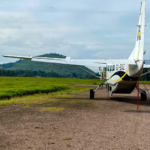Victoria University launches Career Readiness and Employability Program Tailored towards innovativeness and current job market demands

Uganda’s traditional education system faces imminent revolutionalisation as Victoria University takes a precedent, with the launch of the Career Readiness and Employability Program (CR&EP).
The high-precision study program which is effectively tailored towards innovativeness and current job market demands was launched 3rd May 2023 in the University main auditorium, Kampala campus. Among other merits, the program will offer career readiness and placements for students in the UK, Uganda, and Germany.
In this new program, the university will start with Hospitality and IT graduates, among others. The launch which was graced by the Director of Human Resource Uganda Police-AIGP Godfrey Kiwanuka Golooba attracted high-end industry experts, employers, business entrepreneurs and other icons in the global innovation space, who tipped students on the available employment and business opportunities that can easily be taken advantage of, to bring beauty to their lives after studies.
While addressing participants during the CR&EP launch, Brig.Gen. AIGP Golooba hailed Victoria University as a distinctive player in Uganda’s education sector, focusing on new opportunities to serve the society through transformation of higher education to meet emerging challenges of the time and the future, by going beyond comprehensional approaches. He added that the university sets a precedent for other higher learning institutions to follow suit and revolutionalise Uganda’s old-fashioned education system. “Victoria university is a fitting description of how universities in Uganda and the world must respond to the new economy and associated trends such as digital disruptions and radically changing labor markets,” AIGP Golooba told participants.
The Vice Chancellor for Victoria University Dr. Lawrence Muganga told students during the same launch that the current job market no longer focuses on impressive academic credentials, but one’s unique practical capabilities.
“There is no employer now who is looking for your beautiful credential, they are looking for your ability, experience, but universities are graduating people with zero years of experience. We are not going to be that kind of university. Therefore, that’s what we are launching today, the career readiness and employability,” noted VC Muganga.
It is imperative to note that the CR&EP is premised on perpetuating hands-on learning for students, such that they enter the workforce with vital knowledge, skills and attitudes related to a certain career path. Dr. Muganga also explained the vitality of nurturing learners with competencies tailored to job creation, not job seeking, after completion of their respective study programs.
“All universities and other tertiary institutions in this country produce almost 150,000 graduates but of the entire country the people who retire from official service in this country they are around 4000 in the country, so that means every person you see retire, there is almost 40 people, graduates waiting for that position, and these people don’t even retire.” “So therefore, as universities we must rethink the way we deliver education. That means we must craft to nurture to create a graduate who not only thinks of simply roaming around looking for jobs, but rather be the makers of jobs, the innovators, the creators, and even when they are looking for jobs. They are the first people any employer will look out to and say, this is the person who is going to add value to this organization,” Dr. Muganga further asserted.
Frank Gashumba, a social entrepreneur and philanthropist on his part implored students to have confidence in their abilities to attain set goals, exercise assertiveness and build healthy social circles. “The world does not celebrate how many certificates you have, but who are you in the society? Every time you leave your house, dress as if you are going to meet your ex-lover. 67% of the jobs are not advertised. It is through networking and the people who you know,” Gashumba advised learners.
The Model works in such a way that learners will pursue one course unit a month as opposed to six, in a single semester. Students’ academic year will be divided into three semesters, with each semester divided in four blocks which will run for four months, with a prime aim factualizing a greater focus for learners, through learning one thing at a time, in smaller groups with collaborative lectures.







